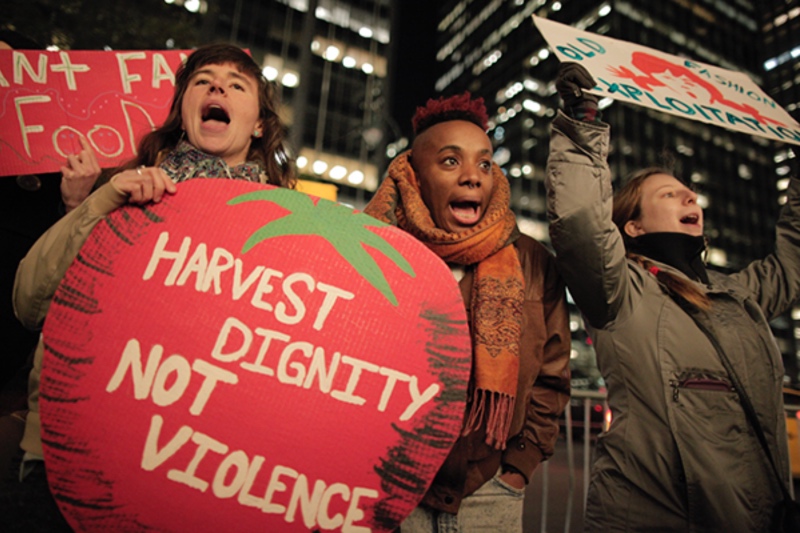Independent Australia highlights Fair Food Program, calls on business leaders to take action: “…those leaders brave enough to face the problem and commit to solving it have much to gain, not the least of which is a positive impact on the bottom line.”
Even Down Under, the Fair Food Program is blowing up!
An excellent article came out yesterday on the escalating crisis of sexual harassment and assault in Australia, published by the Independent Australia news hub. For anyone unfamiliar with the Australian news media landscape, Independent Australia is a fantastic journal focusing on “politics, democracy, the environment, Australian history and Australian identity,” featuring news and opinion pieces from Australia and around the world.
The article, titled “Combating sexual harassment in the work place — leading the way to change,” opens with deeply troubling data from a recent national survey, revealing soaring rates of sexual harassment in Australia. Here are just some of the staggering statistics revealed by the study, which was conducted by the Australian Human Rights Commission last year:
- One in three people reported being sexually harassed in the workplace — this figure has risen by 21% since 2012.
- 71% reported being sexually harassed at some point in their lives and that women are far more likely to experience sexual harassment than men — 85% versus 56%.
- Young people are at the greatest risk in the workplace, with the figures suggesting that 45% of people aged between 18 and 29 had been subjected to this kind of treatment.
- Alarmingly, one in five 15 to 17-year-olds reported experiencing sexual harassment at work.
Shifting to the search for possible solutions, journalist Sonia Hickey emphasizes the need for real accountability and identifies the new gold standard for stopping sexual abuse at work: The Fair Food Program, singled out in the article as “the kind of change we need to see if we’re to eradicate sexual harassment once and for all.”
To close, we are reposting an extended excerpt from Independent Australia’s excellent piece (and certainly encourage you to check out the IA website to read the article in full!). Please read and share widely!
Combating sexual harassment in the work place — leading the way to change
By Sonia Hickey |
… Measuring the impact on the bottom line
Here’s the thing: Traditionally, companies have shown that they won’t act unless there is community pressure or a Government mandate to do so.
With this in mind, today’s leaders have a real opportunity to make a difference.
What if we singled out sexual harassment as a standalone business issue, no longer bundling it in together with all other Human Resource matters?
What if we encouraged leaders to take a courageous, real, honest look at their teams, to determine the extent of the problem?…
… Furthermore, as we have also witnessed over the past decade or so, with the push for businesses to operate in a more sustainable and ecological way, those companies that have embraced change (such as becoming paperless offices or removing child labour and excessively polluting factories from their supply chains) have not just had a positive impact on the environment, they’ve won the hearts and minds of employees and consumers.
There are real positives for brand reputation (and a direct measurable increase in both employee and customer engagement and loyalty, resulting in profit) when a company openly acknowledges a problem it is perpetuating, takes responsibility and can prove effective change.
Women tomato pickers in Florida took a similar approach with positive effect. The Coalition of Immokalee Workers, representing the tomato pickers, fought to have a safe complaint system written into their labour agreement — the Fair Food Program. In addition to better pay and improved working conditions, workers insisted on a way to address sexual harassment. And they added a small but hugely significant detail — an independent body to be the arbiter. Complaints take some time to investigate and address, but there are real-life consequences for farmers who don’t take action against employees found to be perpetrators of sexual abuse.
By also convincing some of the USA’s biggest tomato purchasers (for example: McDonald’s, Walmart, Whole Foods) to only buy produce from fields that were part of the Fair Food Program – which ensures workers are treated justly – the consequences for farmers who don’t take action is that they won’t be part of the Program and therefore cannot sell to the large tomato buyers. Their market disappears.
This is the kind of change we need to see if we’re to eradicate sexual harassment once and for all.
For Australian workplaces to continue along and blindly accept high rates of sexual harassment as the “norm” is no longer tenable. And any company leader that believes that sexual harassment is not happening under his or her watch is kidding themselves. Nothing changes if nothing changes, but, more than that, those leaders brave enough to face the problem and commit to solving it have much to gain, not the least of which is a positive impact on the bottom line.



